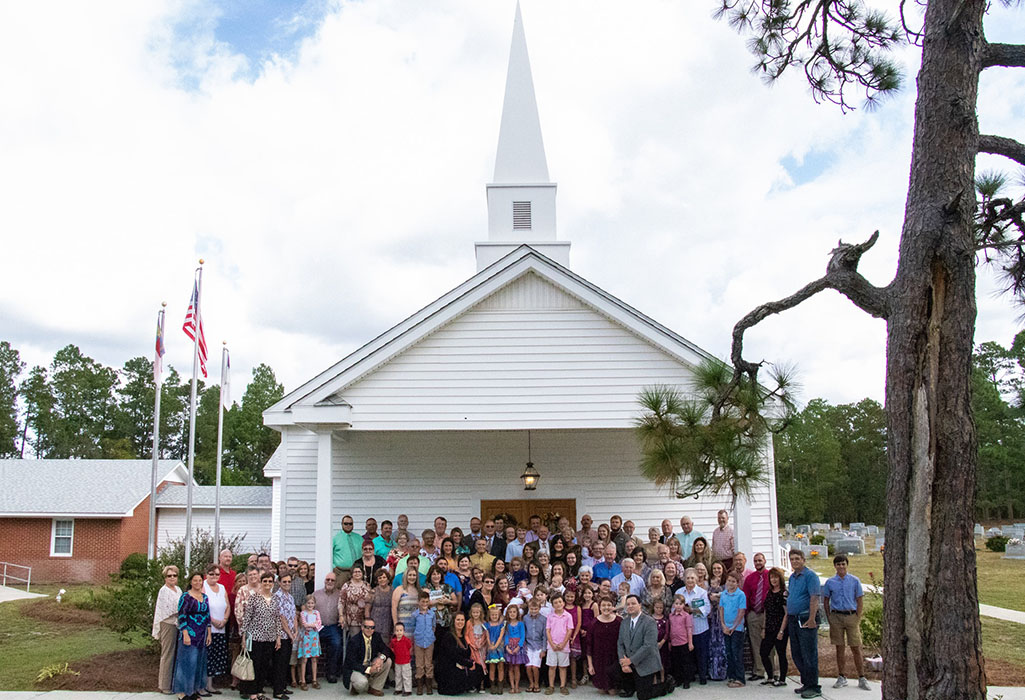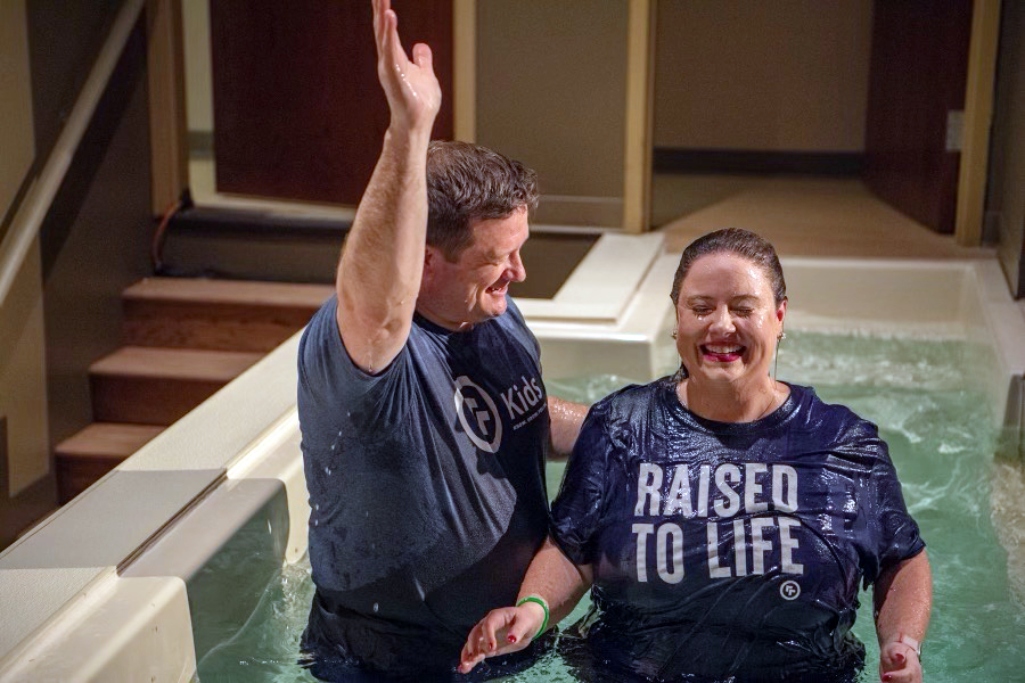
Members of Haw Bluff Baptist Church, where Jacob Lewis serves as pastor.
KELLY, N.C. – Post-COVID church attendance studies indicate a positive trend in many congregations as members and guests alike return. Still, U.S. Protestant churches report current attendance at 85 percent of their typical worship service levels prior to COVID. These statistics may concern church leaders, seeing pandemic wounds heal but wondering about the metaphorical scar tissue left behind.
There’s no doubt the pandemic has impacted the size, mentality and ministry opportunities for the local church. However, COVID has also proved to be a valuable teacher to the church. Here are three lessons God taught our church through COVID.
1. Our time in church is valuable
In John 9:4, Jesus says, “We must do the works of him who sent me while it is day. Night is coming when no one can work” (CSB). How many churches in the modern era have retained the sense of urgency the early church felt after receiving the Holy Spirit at Pentecost? There is a great temptation to simply “mark time” week after week at your local church. Members are tempted to take a more passive role in ministry and slip into a languid, spiritual daze.
What a wake-up call COVID was in this respect. Suddenly, churches across the country were thrown into panic over scheduling and timing. Almost overnight, every deacon board and committee became engaged in answering the question, “How can we spend our time in church most effectively?” Our time together as a church is valuable and should be spent engaged in meaningful worship and ministry.
2. Flexibility is our ally, not our enemy
There’s a phrase used in churches across the world that causes any pastor to groan. This phrase, and the attitude behind it, can be fostered in churches that become stagnant, albeit often well-meaning, in their ministry. You may have heard it used in your church before. It will sound something like: “We’ve always done it that way” or “We’ve never done that before.” It’s an easy pitfall for a church of any age, style or size to become uncomfortable with any kind of change in church routine.
Then, along came COVID. By April 2020, much of what had “always been done” had disappeared from weekly church life. The pandemic allowed us to reacquaint ourselves with the power of flexibility. Paul speaks to this power in 1 Corinthians 9:20-22. Our ability to conduct worship and evangelism anywhere and anytime in unconventional ways is a tool that has allowed Christianity to survive tyrants and plagues throughout history. Based on this lesson, our church used this shift in traditions and norms to prune away programs that simply did not serve the gospel mandate.
3. The individual suffers without community
Many of your congregants that have yet to return post-COVID were struggling with church attendance long before any mask mandates. The alarming truth is, the modern, American believer is often more deeply in love with convenience than with Christ. Yet, there’s a silver lining to this dark cloud.
The believers who returned to church post-COVID – the ones who made it a priority – were genuinely desperate for community. Some of the most powerful experiences of worship I’ve had at my church flowed out of the sweet longing for fellowship that was almost tangible on those first few Sundays back. Pastor, don’t let the missing sheep discourage you. Be encouraged by each one the faithful Shepherd brought back. Anyone who makes church attendance and involvement a priority in a post-pandemic world does so with the understanding that community is essential to the Christian walk.
3 questions to spark change
Every church that has survived the pandemic has wrestled with these three lessons and emerged with a better understanding of what it means to be a living, biblical church.
These hard-won truths should empower church leaders to look at their local church from a new perspective. Pastors, be bold in asking the tough questions. Your congregation is wrestling with these lessons. Now is the time for spiritual discernment and change.
Look at your post-COVID congregation and ask: What is the best use of our time together? How can we better foster community within our church body? What about our church program and ministry needs to change?
When you start asking these questions, God will move in astounding ways. In our church, several programs emerged post-COVID as we asked these simple questions.
Church-plant partnership: What is the best use of our time together?
COVID reminded us that the church isn’t the facility; it’s the families. For most churches, sanctuaries and classrooms sit dormant for a large percentage of the week. The post-COVID era has challenged us to reach out and use our facilities for more. The Lord led us to partner with a local Hispanic church, allowing them to use our facilities and redeeming the time and space of the church for ministry. Ask the Lord to lead you in finding ways to utilize every hour of the week and every inch of space in your church. At the end of the day, it all belongs to the Lord.
Small groups focus: How can we better foster community within our church body?
In asking this question, we were led to re-focus our efforts on smaller group meetings throughout the week in the homes of church members. COVID reminded us that the church can meet anytime, anywhere – from a parking lot to a live stream on social media. Home meetings are a natural outcome of the pandemic, and our congregation has found the intimacy and casual nature of those small group meetings refreshing.
Community outreach: What about our church program and ministry needs to change?
One major drawback churches experienced during the pandemic was the complete inability to do large-scale gospel outreach. Even at the height of COVID, many churches utilized creative avenues to share the gospel. Even with inventive events like “Drive Thru VBS” it was hard to reach out to the community when we were quarantined to our own four walls.
There are many in your congregation who would find it empowering and refreshing to host and serve in a large-scale community event sponsored by your church. Look at your calendar. Where could your church host an Easter egg hunt, spring fling or summer block party? The gospel must be preached. How are you bringing it to your neighbors?
Every post-COVID event we’ve held at our church has been met with positive community feedback. In my mind, this indicates one very hopeful thing: our neighbors – our unreached friends and family – have missed those opportunities for fellowship, guidance and a safe environment as much as any church member. They are hungry; feed them.
Pastor, be strong! Know you are not alone in your post-COVID struggles. What our enemy has intended for evil, the Lord will use for our good and His glory. Pray and seek His hand in your church as we serve in His kingdom together.
This article originally appeared at lifewayresearch.com. For more insights on church and culture and practical ministry helps from Lifeway Research, sign up for their Daily Insights newsletter.
(EDITOR’S NOTE – Jacob Lewis is pastor of Haw Bluff Baptist Church in Kelly, N.C.)


